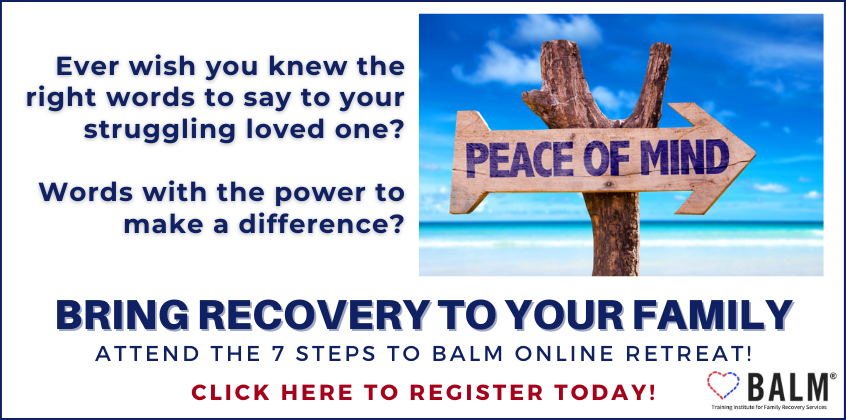The BALM Blog
See all posts“I am afraid to say anything to my loved one with SUD”

I remember how hard it was to talk to my loved one when he was using. I was, truthfully, afraid.
Afraid of what he would say. Afraid I was wrong. Afraid he would yell. Afraid I was telling another adult what to do. Afraid he would leave. Afraid he would think I didn’t trust him. Afraid he would focus on my faults (which did exist) and I wouldn’t know what to say…
And
I was angry. So angry that I thought I might scream and lose my mind if I opened my mouth.
And then I figured out that I could stop, watch, take notes, and just share what I was seeing and hearing without opinion or emotion. I did that and he did hear me and choose recovery.
Years later, during a reoccurrence of his use, I forgot how well that worked. Over a period of a few years of my husband’s escalating use, coupled with the many other challenges life inevitably brings, I fell off my clear communication wagon and lost my courage. I shoved what I was seeing and hearing down my throat due to all of the fears so clearly stated above, chiefly, the fear of his rage and that he would leave me.
It took work to reacquire my courage, but with the help of a coach, a sponsor, Alanon, a Spiritual Director, and my own desparation, this time, I started with attaining a sense of inner calm. This allowed me to look back over the current years of lying and deceit that only a person who’s brain is hijacked by SUD or other addictions can inflict on those around him or her. I listed all of the inconsistencies over a total of five years and started sharing them with my loved one directly.
It took 3-4 months to get to the point of doing it well and making the impact I was looking for. Then, it took continued practice to contribute to his sustaining his recovery after attaining.
A few years later, with recovery re-established in our family, I took what I did and started teaching it to families. A few years after that, upon the request of the coaches I was then training, I wrote down the process it took to help a loved one shift into a 7 step process. Michael DeForbes, who at that time was my student and now is the lead 7 Steps teacher , announced in class, “You have created a transformation process.”
And so I had.
Today, families learn that process as part of our three-prong BALM (Be A Loving Mirror) Family Recovery method, which includes Information, Transformation, and Support.
We provide it all in a one-year program designed to shift both the family members’ and the loved one’s mindsets through a structured process that creates positive change in families everyday.
Of course, the one year program provides the powerful means to acquire this change. And, the transformation provided in the 7 steps provides the action steps of the process, bringing it to life. The 7 steps course offered 12 times a year in 8 ninety minute sessions each time as part of the BALM One Year Online Family Recovery Program and as part of our BALM Family Recovery Life Coach Training Program.
Each year, we provide a retreat for those who wish to experience the steps in a fast format of 2-3 days. This provides families in crisis with a quick way of learning how to conduct BALM conversations, as well as a reinforcement of the 7 steps process previously studied in the 8-week format. Since this is a process most BALMers find themselves using throughout their lives to enhance communication as well as to help struggling family members, it is a course people come back to again.
As part of our ICF-ACTP, the online weekend retreat can provide one of the two required 7 steps go rounds for our coach trainees as well as a continuing ed course for those looking to renew their ICF Coach certification. (The course provides 8 CC and 12 RD credits for certified ICF Coaches.)
All course participants will receive a hard copy of the 7 Steps Handbook designed especially for the retreat. Those interested are encouraged to register asap so the handbook will arrive in time for the retreat.
To learn more and register for the retreat, click here .
